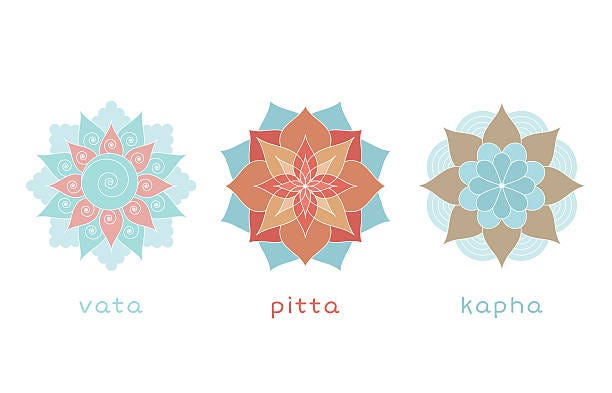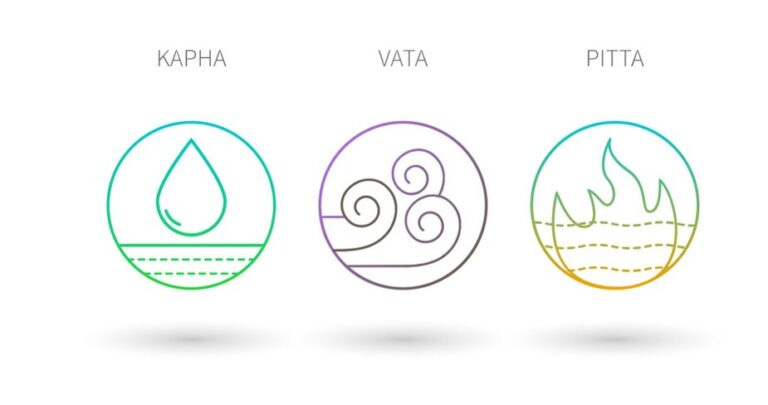What’s Your Dosha—and What’s It Got to Do with Your Health?
A new (old) way to understand why your body reacts the way It does.
It started with what most would call a foot massage, but it was so much more than that. This was reflexology, the kind where your foot becomes a roadmap to the rest of your body. As my reflexologist worked methodically, I couldn’t take my eyes off the art on her wall: a chart showing the pressure points on the foot that correspond to the lungs, heart, intestines, even the sinuses. It made me wonder: How can something as simple as the foot reveal so much about the body’s health?
That moment sparked a deeper curiosity. I asked my reflexologist more questions, and that led me from reflexology into the world of doshas—an ancient Ayurvedic framework that’s surprisingly relevant in our high-tech, over-informed age.
It also sparked me to think about how to view health from the lens of health being imbalanced, not broken.
What would happen if we started thinking about our health in this way? Could this be a way for you to think about your health? How would that change how you approach your health? Let’s explore. Plus, take the What’s Your Dosha? Quiz and discover your predominant dosha!
So, what is a dosha?
In Ayurveda, an ancient Indian system of medicine, doshas are the biological energies present throughout the human body and mind. In Ayurvedic practice, the doshas govern all physical and mental processes, providing a blueprint for health and healing. There are three main doshas—Vata, Pitta, and Kapha—and each of us has a unique combination of these, much like a fingerprint of our health.
Vata is associated with air and space—think movement, energy, creativity, and change.
Pitta is fire and water—linked to digestion, ambition, metabolism, and sharp thinking.
Kapha is earth and water—steady, nurturing, strong, and stable.
Each dosha comes with its strengths and its vulnerabilities. When in balance, they support our energy, digestion, immunity, focus, and mood. But when out of balance, they manifest in symptoms we often overlook or misinterpret, such as bloating, irritability, fatigue, gut imbalances, racing thoughts, or feeling stuck.
How do you know your dosha?
You don’t need a blood test to find out. In fact, this is one of the most accessible forms of self-awareness we have.
You can start by asking:
Do I tend to feel cold, dry, and get easily distracted? That’s likely Vata.
Am I sharp, intense, and quick to overheat—physically or emotionally? Probably Pitta.
Do I crave comfort, move slower, and resist change? Classic Kapha.
Most people are a blend—say, Vata-Pitta or Kapha-Pitta—but one usually dominates. And interestingly, while your core dosha (called Prakriti) doesn’t change, it can get thrown off balance (Vikriti) due to stress, diet, environment, or even the season.
This is where Western thought about health differs from the Eastern perspective, which views health as being out of balance.
Instead of asking what’s wrong with me?, could we begin asking what’s off balance?
Instead of reacting to symptoms with a quick fix, could we start making choices that realign us with who we are, not who someone else is?
That’s the kind of self-awareness most health systems don’t even touch.
It explains why some people thrive on raw salads and long-distance runs, while others feel better with warm soups and yoga. It also explains why some people can’t tolerate spices, while others thrive on them. Or maybe your spouse is cold all the time, while you’re opening the windows to cool down. It’s a loving approach to health, centered in self-kindness. It’s not a personality flaw. It’s not a mindset problem. It might be something simple like balancing yourself. Doshas give us that perspective.
It’s ancient—but it’s not outdated.
We tend to write off anything that sounds ancient as “woo woo,” but this framework predates lab coats by thousands of years and still holds its own in integrative health clinics today. While the language is poetic (air, fire, earth), the principles are biologically intuitive.
In fact, many healthcare practitioners are starting to blend these ideas into patient care to personalize treatment better. Functional and integrative medicine approaches are borrowing these insights to understand factors such as disease risk, medication tolerance, stress response, food tolerance, and even recovery speed.
To be clear, this isn’t about ditching modern medicine. It’s about adding depth to how we see ourselves, which adds a new layer of understanding that honors who you are, not just what’s wrong with you.
Want to explore your dosha?
If you’re intrigued, take this as a nudge. Read a little. Reflect a lot. You can start by taking a dosha quiz. There are many good ones online that walk you through body, mood, habits, and preferences, but I threw a quick one together for you here.
Take a moment. Don’t overthink it—go with your gut:
1. My body tends to feel...
A) Cold and dry
B) Warm and sweaty
C) Heavy or sluggish
2. My personality is more...
A) Energetic, anxious, creative
B) Focused, driven, intense
C) Calm, caring, steady
3. Under stress, I...
A) Worry and lose sleep
B) Get irritated or angry
C) Withdraw or overeat
4. My digestion is usually...
A) Inconsistent—bloating, gas, constipation
B) Strong—but prone to acid reflux or diarrhea
C) Slow and steady—but sometimes sluggish
Mostly A’s? You lean Vata
Mostly B’s? You’re likely Pitta
Mostly C’s? Hello, Kapha
Most of us are blends of all three—but one dosha usually dominates.
Now that you know your dosha, you can use foods to balance your dosha.
For Vata (airy, scattered, cold):
Goal: Warm, grounding, moistening
Cooked grains like oatmeal or rice
Roasted root vegetables
Stews, soups, and warm herbal teas
Healthy fats: ghee, avocado, olive oil
Avoid: raw salads, popcorn, carbonated drinks
For Pitta (fiery, intense, hot):
Goal: Cooling, soothing, hydrating
Cucumber, mint, coconut water
Sweet fruits (melons, mango)
Leafy greens, basmati rice
Herbal teas: chamomile, fennel, licorice
Avoid: spicy, fried, acidic foods (tomatoes, vinegar)
For Kapha (heavy, slow, cold):
Goal: Light, warming, stimulating
Steamed greens, spicy curries, lentils
Apples, berries, and light fruits
Ginger tea, black tea, small amounts of coffee
Avoid: dairy, sugar, heavy carbs, cold leftovers
Again, you don’t need to overhaul your diet. Just tweak it with intention, and watch what shifts.
You can also start to notice things like stress, cold weather, and overworking, and how they throw you off balance. This tells you which dosha may be rising or falling out of balance. Start experimenting! Shift your habits. Try grounding foods if you feel airy. Move more if you feel stagnant. Cool down if you feel overheated—physically or emotionally.
Curiosity is the first step to shifting health.
When you look through the dosha lens, you stop asking What’s wrong with me? And start asking What’s out of balance?
Doshas are a fresh way to look at your health and how you interact with it. Part of this journey should lead you to a place where you’re not overreacting, but investigating, testing, learning, and exploring. Make tiny shifts and see how they can help you heal faster, feel better, and live in sync with who you already are in the moment. Because we are constantly changing, we’ll continuously need rebalancing. Maybe this is one of the tools you can try to get your health back into equilibrium. I’ll keep offering new perspectives, like doshas, throughout my writing. Maybe I’ll dive into reflexology at some point, too. Stay tuned!
And that’s what Health Shift is all about: shaking up the way we view health, so we can finally move forward and be more aligned with who we are and what we need.
See you Thursday, health heroes!
Dr. Alice
A little more about Dr. Alice Burron and Strategic Action Health:
Dr. Burron is a co-founder of Strategic Action Health, dedicated to helping organizations help their employees make better health decisions. Come check us out here!
Catch us on Instagram: @the.health.navigator and @dr_burron
You can also connect on LinkedIn, if you want to be professional about it. 👓
And if you’re not subscribed to Health Shift here on Substack — it’s time! This free newsletter is packed with valuable information and approaches to help you on your journey to better, faster healing.
Health Shift: Your Strategic Guide to Making Strategic Health Decisions book will officially launch on May 17, 2025! Mark your calendars! And if you’re in Cheyenne, join us for our party at Blacktooth Brewery. Have a beer on us! More information is coming soon.









